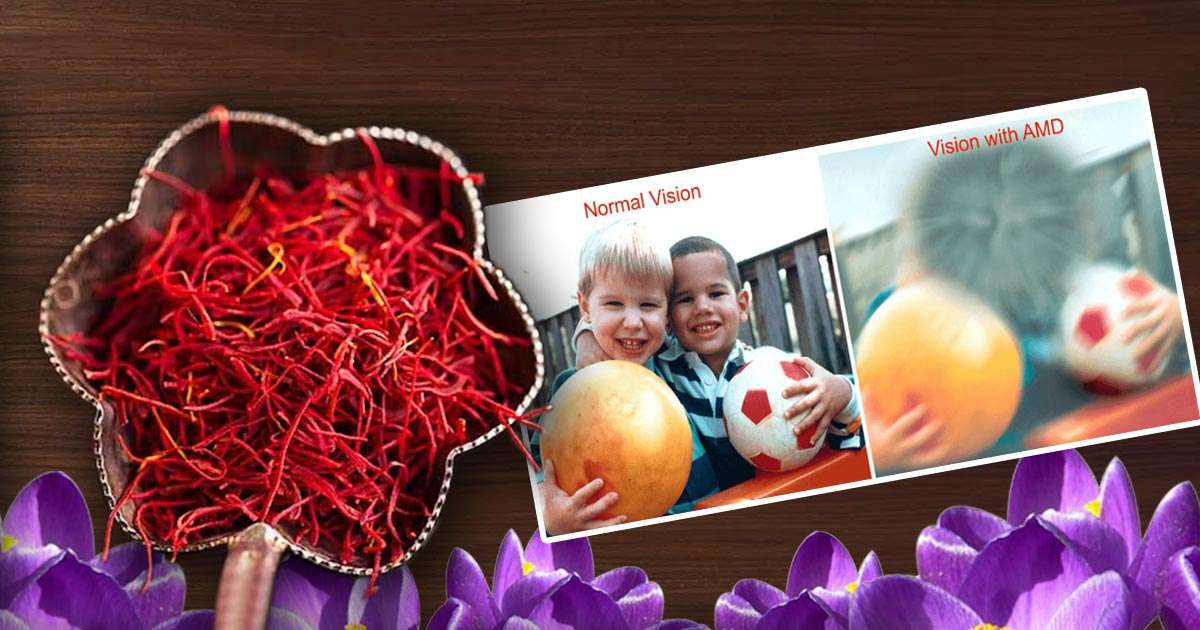How Much Saffron to Take for Macular Degeneration?

Age-related macular degeneration (ARMD) is a frequent eye problem that often develops as people age, causing gradual loss of eyesight over time. While treatments exist, the use of saffron as a natural remedy has gained attention for its potential benefits in supporting eye health.
What is Macular Degeneration?
Macular degeneration is a condition that impacts the center of the retina, known as the macula, which is crucial for clear, central vision. It’s a disease that worsens over time, causing vision to become blurry or distorted, which can make activities such as reading or driving challenging.
As we get older, the cells in the macula can get damaged, which can cause ARMD to develop. This condition can be categorized as either dry or wet, with dry ARMD being more common and characterized by the gradual breakdown of light-sensitive cells in the macula.
How Can Saffron Help with Macular Degeneration?
Saffron, a spice derived from the Crocus sativus flower, has shown potential for supporting eye health, particularly in individuals with ARMD. The substances in saffron, like crocin and crocetin, work as antioxidants and anti-inflammatory agents. They help shield the retina from oxidative stress and inflammation, which can worsen ARMD.
Studies have indicated that saffron supplementation may improve visual acuity and sensitivity to light in individuals with early-stage ARMD.
Do Saffron Supplements Help Macular Degeneration?
Research into the effects of saffron supplements on ARMD has shown promising results. Clinical trials have demonstrated that regular intake of saffron extracts, typically ranging from 20 to 30 mg daily, can lead to improvements in visual function over several months.
One study found that participants who took saffron supplements experienced enhanced visual acuity and contrast sensitivity compared to those who did not. These discoveries indicate that saffron could be helpful in treating ARMD, especially in its initial phases.
How Can You Take Saffron for ARMD?
You can take saffron in different ways to help your eyes stay healthy. It’s commonly available as a supplement in capsule or tablet form, ensuring consistent dosage and potency. Additionally, saffron threads or powder can be incorporated into cooking or beverages for those who prefer a more natural approach.
When picking saffron supplements, it’s important to choose good-quality products from trusted sources to make sure they work well. It’s wise to talk to a doctor, especially if you have health issues or take other medications.
How Much Saffron Should I Take for ARMD?
Deciding how much saffron to take for ARMD depends on factors like your age, health, and how serious your condition is. Typically, a daily dosage of 20 to 30 mg of saffron extract has been used in clinical trials with positive outcomes.
It’s very important to follow the dosage advice given by doctors or the makers of the supplements to get the best results safely. Starting with a small amount and slowly increasing it while being monitored can reduce any possible side effects and make sure it works well.
How Does It Work?
Saffron’s beneficial effects on ARMD are attributed to its antioxidant and anti-inflammatory properties. The substances crocin and crocetin in saffron prevent harmful free radicals from harming the cells in the retina.
These mechanisms not only protect existing retinal cells but also promote the regeneration of healthy cells, contributing to improved visual acuity and maintenance of central vision.
Side Effects of Saffron
- Mild Gastrointestinal Upset: Some people might feel a bit sick in their stomach when they take saffron supplements, causing nausea or diarrhea. Taking saffron with food can often ease these issues because it makes the stomach less sensitive, and they typically don’t last long.
- Allergic Reactions: While rare, allergic reactions to saffron can occur. Symptoms can include itching, a rash on the skin, or swelling of the lips or tongue. If allergic symptoms appear, it’s important to discontinue saffron use immediately and seek medical advice promptly.
- High-Dose Concerns: Taking too much saffron can cause stronger side effects. These might include feeling dizzy, having a dry mouth, or feeling different emotions, like being more annoyed or anxious. To prevent these problems, it’s really important to stick to the saffron dose that’s recommended and talk to doctors before taking more.
What Other Foods or Supplements Help ARMD?
- Omega-3 Fatty Acids: Omega-3 fatty acids, which are plentiful in fatty fish such as salmon and tuna, are important for keeping your eyes healthy. Regular consumption of these fats may help reduce the risk of advanced ARMD and support overall eye function.
- Antioxidant-Rich Foods: Incorporating foods rich in antioxidants into your diet can provide vital nutrients that promote eye health and protect against oxidative stress. Berries like blueberries and strawberries, as well as leafy greens such as spinach and kale, and vegetables like carrots, are really good sources.
- Vitamins C and E: Vitamin C and vitamin E have strong antioxidants that are good for your eyes. These vitamins can be obtained through dietary sources such as citrus fruits, bell peppers, nuts, and seeds, or through supplements recommended by healthcare providers to enhance overall eye function and maintain healthy vision.
Enhancing Eye Health Naturally
Saffron offers a natural approach to supporting eye health, particularly in managing age-related macular degeneration.
Incorporating saffron into a balanced diet or as a supplement, alongside other beneficial foods and nutrients, can provide comprehensive support for maintaining clear vision and overall eye health. For personalized guidance on saffron supplementation and optimal eye care, consulting with a healthcare professional is advised.

